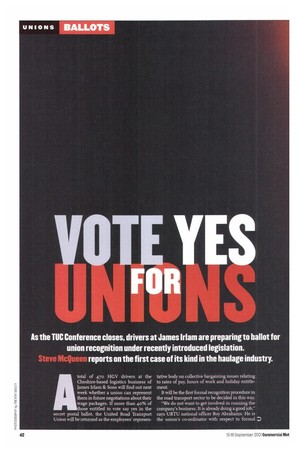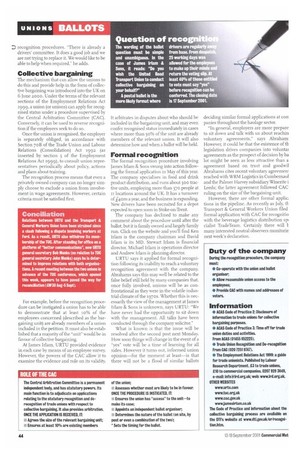As the TUC Conference closes, drivers at James !dam are preparing to ballot for union recognition under recently introduced legislation.
Page 42

Page 44

If you've noticed an error in this article please click here to report it so we can fix it.
Steve McQueen reports on the first case of its kind in the haulage industry.
Atotal of 470 HGV drivers at the Cheshire-based logistics business of James Mani 8c Sons will find out next week whether a union can represent them in future negotiations about their wage packages. If more than 40% of those entitled to vote say yes in the secret postal ballot, the United Road Transport Union will be returned as the employees' represen
tative body on collective bargaining issues relating to rates of pay, hours of work and holiday entitlement.
it will be the first formal recognition procedure in the road transport sector to be decided in this way.
"We do not want to get involved in running the company's business. it is already doing a good job," says URTU national officer Roy Abrahams. He is the union's co-ordinator with respect to formal P 0 recognition procedures. "There is already a drivers committee. It does a good job and we are not trying to replace it. We would like to be able to help when required," he adds.
Collective bargaining
The mechanism that can allow the unions to do this and provide help in the form of collective bargaining was introduced into the UK on 6 June 2000. Under the terms of the relevant sections of the Employment Relations Act 1999, a union (or unions) can apply for recognised status under a procedure supervised by the Central Arbitration Committee (CAC). Conversely, it can be used to reverse recognition if the employees seek to do so.
Once the union is recognised, the employer is separately obliged, in accordance with Section 7oB of the Trade Union and Labour Relations (Consolidation) Act 1992 (as inserted by section 5 of the Employment Relations Act 1999), to consult union representatives periodically about policy, actions and plans about training.
The recognition process means that even a privately owned company can no longer simply choose to exclude a union from involvement in wage agreements. However, certain criteria must be satisfied first.
For example, before the recognition procedure can be instigated a union has to be able to demonstrate that at least io% of the employees concerned (described as the bargaining unit) are already members of a union included in the petition. It must also be established that a majority of the "unit" would be in favour of collective bargaining.
At James Irlam, URTU provided evidence in each case by means of an employee survey. However, the powers of the CAC allow it to examine the evidence and rule on its validity. It arbitrates in disputes about who should be included in the bargaining unit, and may even confer recognised status immediately in cases where more than 5o% of the unit are already members of the relevant union. It will also determine how and when a ballot will beheld.
Formal recognition
The formal recognition procedure involving James Irlam & Sons swung into action following the formal application in May of this year. The company specialises in food and drink product distribution, and runs about 300 tractive units, employing more than 570 people at TT locations around the UK. It has a turnover ofi4om a year, and the business is expanding. New drivers have been recruited for a depot expected to open soon in Stoke-on-Trent.
The company has declined to make any comment about the procedure until after the ballot, but it is family owned and largely family run. Click on the website and you'll find Ken Irlam is the company chairman and David Irlam is its MD. Stewart Irlam is financial director, Michael Irlam is operations director and Andrew Irlam is planning director.
URTU says it applied for formal recognition following its inability to reach a voluntary recognition agreement with the company. Abrahams says this may well be related to the false belief still held by many companies that, once fully involved, unions will be as confrontational as they were in the volatile industrial climate of the 197os. Whether this is necessarily the view of the management at James Irlam & Sons is unknown, says URTU: "We have never had the opportunity to sit down with the management. All talks have been conducted through the company solicitor."
What is known is that the issue will be resolved after the second post next Monday. How soon things will change in the event of a "yes" vote will be a time of learning for all sides. However it turns out, informed union opinion—for the moment at least—is that there will not be a flood of similar ballots deciding similar formal applications at con panics throughout the haulage sector.
In general, employers are more prepare to sit down and talk with us about reachin voluntary agreements," says Abraham However, it could be that the existence of th legislation drives companies into voluntati agreements as the prospect of decision by ba lot might be seen as less attractive than a agreement based on trust and goodwil Abrahams cites recent voluntary agreement reached with WRM Logistics in Cumbernaul and the Palmer Harvey subsidiary Winerite i Leeds; the latter agreement followed CAC ruling on the size of the bargaining unit.
However, there are other formal applic; tions in the pipeline. As recently as July, tl Transport & General Workers Union filed formal application with CAC for recognitio with the beverage logistics distribution spl cialist TradeTeam. Certainly there will 1: many interested neutral observers monitorin next week's declaration.








































































































































